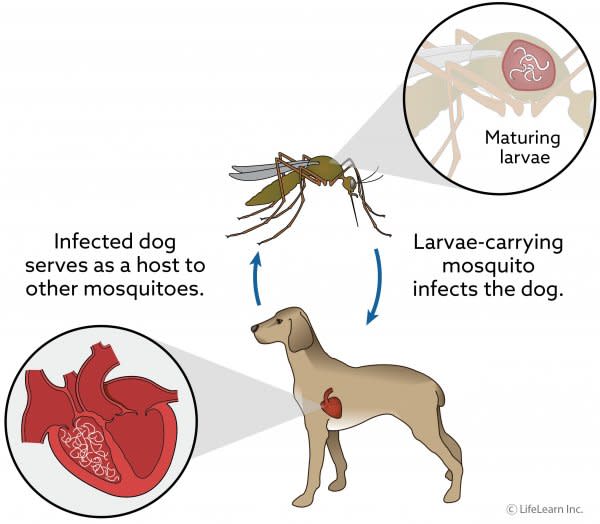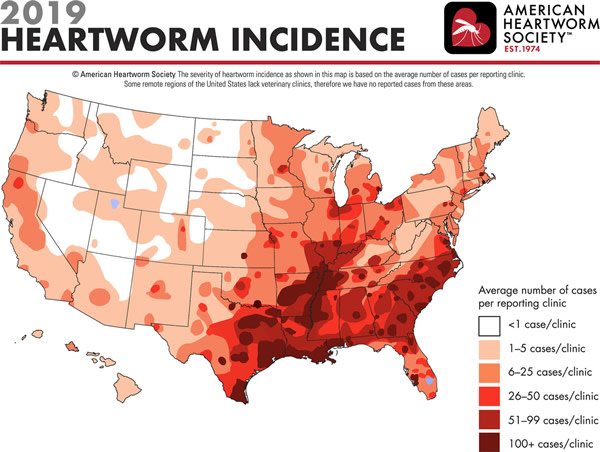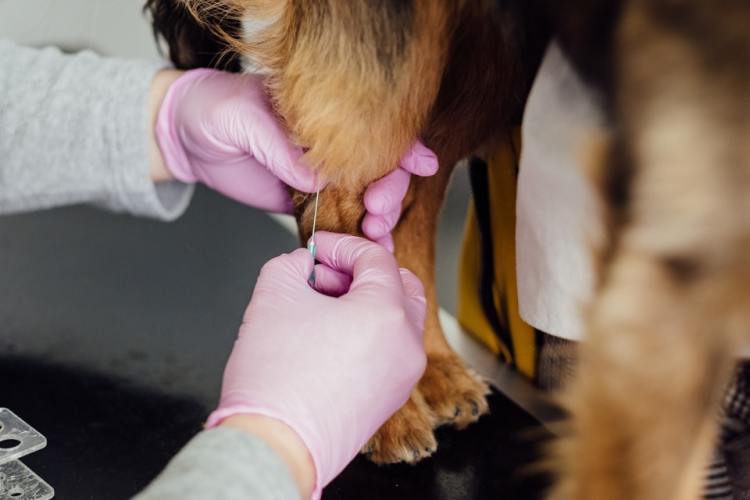Heartworm (dirofilaria immitis) is a parasitic worm that can infect your dog through a mosquito bite. The infective larvae mature into adult heartworms, mate, and reproduce over several months while living inside a dog, spreading through the body over time to eventually live in the heart (hence the name ‘heartworm’), lungs, and the associated blood vessels.
 (Image Source: VCA Animal Hospital)
(Image Source: VCA Animal Hospital)
The disease primarily infects dogs, cats, and ferrets but it can also infect a variety of wild animals including foxes, wolves, tigers, lions, raccoons, seals, etc.
Heartworm disease in dogs is a serious condition that if left untreated can result in heart failure, severe lung disease, other organ damage, and even death.
Pro Tip: Save up to 83% on dog insurance costs and enroll your pup to get reimbursed for unexpected veterinary bills (like heartworm disease). Pet health insurance does not cover pre-existing conditions, so it’s important to enroll before any issues arise.
 Photo by Bruno Cervera from Pexels
Photo by Bruno Cervera from Pexels
How Common is Heartworm Disease?
All dogs are susceptible to heartworm disease, regardless of their sex, age, breed or living environment. In general, wherever there are mosquitoes, there is potential for heartworm infection (dirofilaria immitis) in dogs. This means that heartworms are a potential threat in many countries around the world, as well as in all 50 US states and are a concern all 12 months of the year. In the States, the disease is most common along the Gulf and Atlantic coasts, as well as along the Mississippi River.
 (Image Source: American Heartworm Society)
(Image Source: American Heartworm Society)
Symptoms of Heartworm Infection in Dogs
Heartworm infection is a slow onset disease, which means that months, or sometimes even years, can pass before you realize there’s something wrong with your dog.
How severe the disease is depends on several factors, including:
- How many worms are living inside the dog (i.e. the worm burden)
- How long the pup has been infected
- How its body is responding to the presence of the heartworms
- Its activity level
In other words, symptoms might not be obvious in pups that are not very active, that have been recently infected, or have low worm burdens. When symptoms appear, your four-legged companion could already have a large heartworm burden.
Early signs of heartworm infection in dogs include occasional coughing, shortness of breath, and tiredness after moderate activity otherwise known as exercise intolerance. As the disease progresses, other clinical signs may appear in an infected dog, such as:
- Lethargy
- Trouble breathing
- Weight loss
- Purple or blue discoloration of the gums and skin
- Fainting
- Nasal bleeding
- Spitting up blood
- Persistent cough
- Sickly appearance
In more severe cases, the abdomen might swell with fluid, and heart failure is also possible.
Dog Heartworm Diagnosis
Because heartworms (dirofilaria immitis) are spread by mosquitoes, any dog who is not on preventative medication and is exposed to these insects should be tested. This also counts for pups that spend most of their time indoors as mosquitoes can easily get into homes.
Due to the fact that symptoms develop slowly, the disease is diagnosed primarily in dogs between the ages of 2 and 8 years old. The earlier the disease is detected, the better the chances for effective treatment and recovery.
Veterinarians have several options for diagnosing heartworm disease but in a majority of cases, a blood test will determine the presence, or lack thereof, of the parasitic heartworm infection.
-
The preferred diagnosis method is the antigen detection test because it is considered to be the most accurate for dogs. The problem is, this test can only detect adult female worms. The earliest that heartworms presence can be confirmed in the body is about five months after the dog is bitten by an infected mosquito. That’s why your vet will probably recommend doing this test once a year at your dog’s annual wellness visit.
-
Another heartworm test is used to detect microfilariae in the dog's bloodstream. The presence of microfilariae in the pup’s bloodstream indicates that they’re infected with adult heartworms. Similar to the antigen test, this test can detect the presence of microfilariae about six months after the dog is bitten by an infected mosquito.
If your dog tests positive for heartworm disease via a microfilariae blood test, the veterinarian will use additional diagnostics for confirmation. These tests will also ensure that your pet can safely undergo treatment and recover as soon as possible.
Other diagnostic tools include x-rays and echocardiography. Your vet will decide which test to use depending on the dog’s overall health, as well as previous use of preventive medication.
 Photo by freestocks.org from Pexels
Photo by freestocks.org from Pexels
Dog Heartworm Treatment
If left untreated, heartworm disease will damage the dog’s lungs, heart, kidneys, and liver, eventually resulting in death.
Choosing the best treatment plan will depend on several factors, including:
- How many worms are present
- How much damage they’ve caused
- Whether your pet has another disease.
Pets that are affected more severely might need additional medications to stabilize lung and heart disease before they begin heartworm treatment.
Heartworm infection with adult heartworms is currently treated with melarsomine dihydrochloride (available under the trade names Diroban and Immiticide). This arsenic-containing drug is approved by the US Food and Drug Administration (FDA) and is administered by deep injection into the back muscles to treat heartworm disease in dogs.
Advantage Multi for Dogs is another FDA-approved heartworm medication that is used to eliminate microfilariae in the bloodstream. This is a topical solution that is applied to a dog’s skin.
It should be noted that the heartworm treatment is risky as it can be potentially toxic to dogs or cause serious complications. The fact that treatment of heartworms has many legitimate risks is part of the reason your veterinarian heavily recommends that all dogs be on heartworm preventative year round in the US.
When Is Surgery Necessary?
If the disease reaches a point where a very heavy worm burden forces the blood to not flow properly out of the heart (Caval syndrome), immediate surgery is necessary in order to remove the heartworms manually. This procedure is risky and even if it is performed and the worms successfully removed, many pets with the disease that has reached this severe stage may still die.
Post-Treatment Complications
In some cases, dead heartworms resulting from the treatment might cause respiratory problems. Such post-treatment complications may occur from a few days to six weeks after the treatment.
Signs include:
- Coughing
- Rapid or heavy breathing
- Spitting up blood
- Decreased appetite
- Fever
- Lethargy.
In case of complications, cage confinement will be likely recommended, followed by oxygen treatment and medications to reduce blood clotting and inflammation. If everything is done right, most pups will begin to recover from treatment-caused complications within 24 hours.
In order for the heartworm treatment to be successful, activity and exercise need to be restricted for a certain period of time.
Make sure to keep your four-legged companion in its kennel or indoors most of the time and when it needs to go outside, use a leash, especially if it’s very energetic.
After about 6 months following the treatment, take your pup to the vet for a follow-up test that will confirm that all heartworms have died.
Dog Heartworm Treatment Cost And How To Save
The average dog heartworm treatment cost ranges from $500 - $1,100 depending on the dog’s size, the stage of the disease and the vet bills.
The typical treatment protocol includes blood tests and x-rays to measure the heartworm infection load, sedatives, pain medication, and antibiotics for killing the parasites.
Pet insurance can cover costly treatments your dog might need throughout its life - including a heartworm infection. When comparing pet insurance plans, do some research and talk with your vet about options they may offer, such as payment plans for vet bills.
Pro Tip: Pet insurance can be a life-saver (and wallet-saver), but it does not cover pre-existing conditions, so it's important to enroll sooner rather than later (before any heartworm infection arises).
Wellness plans available as part of many pet insurance plans may even cover most of your annual heartworm preventative medication!
Because vet bills can be expensive, it’s very important not to miss the monthly heartworm treatments. Be sure to take your furry pal for an annual vet checkup every year and keep it up to date with vaccinations, shots, and heartworm treatments. These lighter expenses might help you avoid large bills in the future.
Dog Heartworm Prevention
Due to the fact that heartworm symptoms are often difficult to detect, prevention is the best treatment. Talk to your vet to decide which prevention option is best for your pup, and then use it regularly as directed.
There are many FDA-approved products that prevent heartworm disease in dogs. Your veterinarian might prescribe a preventative monthly oral flea, tick, and heartworm prevention pills like Trifexis or Heartgard Plus, or a topical agent like Coraxis.
There’s also one product that’s injected under the skin every six or twelve months, and only a vet can administer the injection. Some heartworm preventive opinions also contain ingredients that are effective against other parasites (like ticks, mites, and fleas) or intestinal worms (like hookworms and roundworms).
Annual heartworm prevention tests are recommended for all dogs. It is best to begin with preventive treatment at 6-8 weeks of age. At this age, no pretesting is needed but pups that are seven months or older need to be tested for heartworms before starting prevention. Your furry friend might look perfectly healthy on the outside even though there may be heartworms on the inside.
In case a dog that already has the disease isn’t tested before starting prevention treatment, the dog will remain infected with adult heartworms. In addition, giving heartworm preventive treatment to an animal infected with adult heartworms might be very harmful or even deadly.
It is very important for pet parents to give the prescribed dose of prevented medication on a regular basis. Because most preventive medications are given once a month, many owners might forget to administer the drug. Missing a dose can have serious consequences. If you do miss the administration date, make sure to consult your veterinarian about how to proceed and ensure your pup stays safe.
Final Words
Heartworm disease is costly, but the most important thing to remember is that a heartworm infection can be easily avoided by listening to your veterinarian and using preventative medications that are cheap and easy to administer. Make sure to keep your dog healthy all year round by following steps like annual checkups, annual heartworm testing, and an appropriate preventative treatment plan prescribed by your vet. This is the best way to protect your dog and avoid this expensive, potentially life threatening disease.
